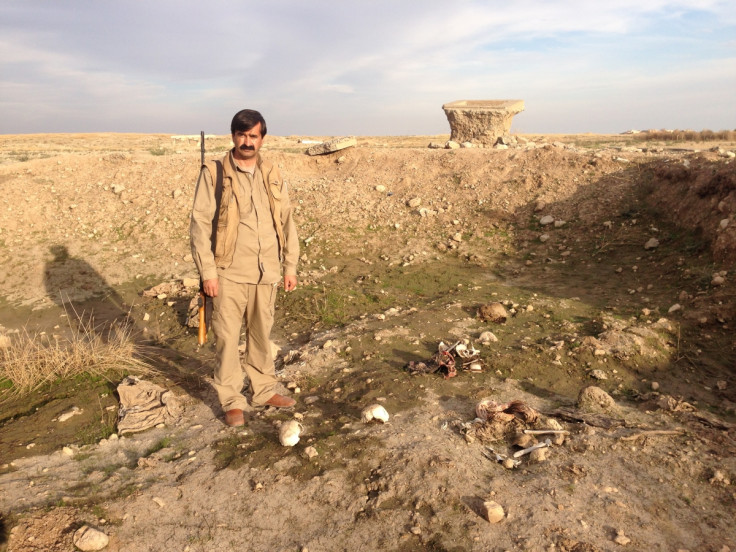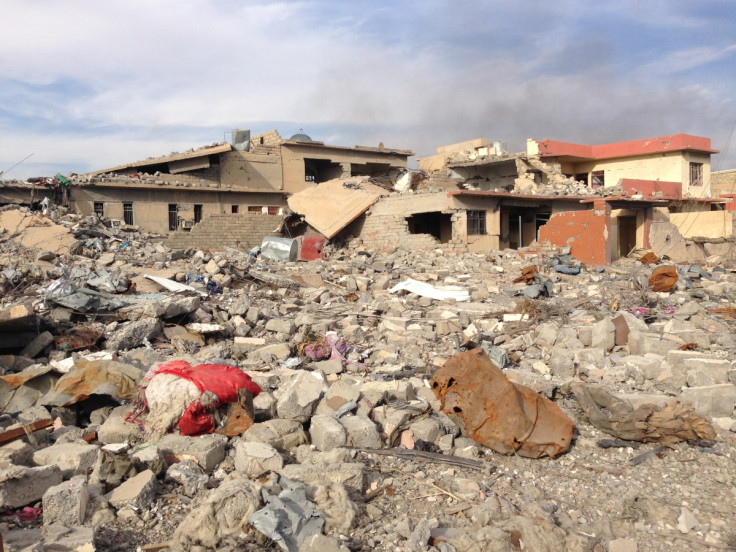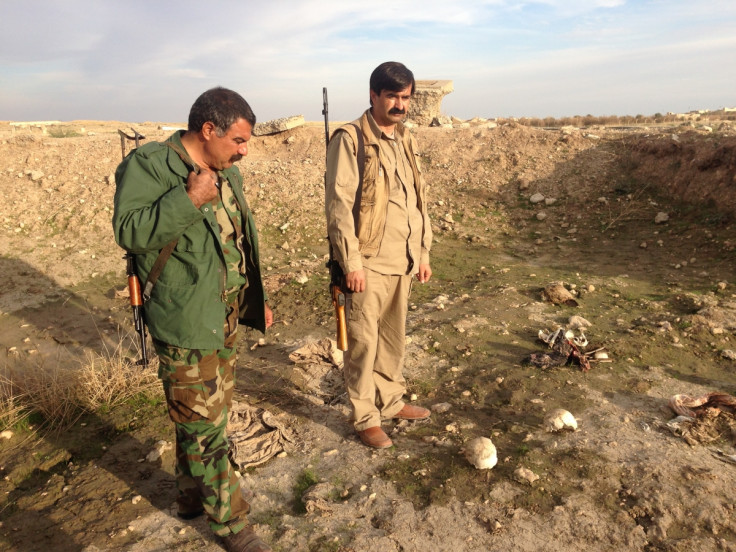Iraq: Isis massacre of Yazidi women deemed unworthy sex slaves discovered in liberated Sinjar

Nasser Pasha stood at the bottom of a dirt pit on the outskirts of Sinjar and gently lifted the top of a human skull out of the mud. A human jaw, clumps of hair, bones, clothing fragments and a woman's plastic sandal protruded from the earth: remains of 78 Yazidi women believed to have been killed by Islamic State extremists after they overran the surrounding area last August, according to the local official from the Kurdistan Democratic Party.
The mass grave at the Sinjar Technical Institute was one of three discovered after an operation to drive IS from the northern Iraqi town last week. "We have information that there are dozens more such mass graves further to the south, in areas still controlled by IS," said Pasha, adjusting the Dragunov sniper rifle slung over his shoulder.
Pasha said that a witness from the town had said that IS had separated the women between old and young, with the girls told that if they converted to Islam, their older relatives would be saved. When the young Yazidi women did so, their relatives were killed anyway and the girls taken away as slaves to IS fighters. The bodies at the institute are of just a small number of those victims.
To be honest we don't dare return unless the situation here is secure. We need an international protection force for the Yezidis. If not, another Islamic group will form to hurt us, and if not us then our children
After 15 months under Isis control and months of heavy coalition air strikes, Sinjar was largely freed in a day last Thursday by a force of 7,500 Kurdish Peshmerga fighters, alongside PKK guerrillas and their Yazidi and Syrian affiliates. Jubilant Yazidis celebrated the liberation of the city, while the Peshmerga claimed the operation as a major victory which severed crucial Isis supply lines between Iraq and Syria.
As well as uncovering further evidence of IS crimes against humanity, the days after the liberation have highlighted the deep antipathy Yazidis feel towards their former Arab neighbours, and reveal increasing tensions between the different Kurdish and Yazidi forces stationed in the city over who should receive credit for the operation and how the city should now be administered.
A disputed victory
Kurdish and Yazidi fighters entering the city on Thursday encountered suicide truck bombers and a number of snipers, but the majority of remaining IS extremists fled without a fight. The bodies of 300 IS militants were left in the ruins, according to a statement by the Kurdistan Regional Government. Peshmerga commanders portrayed the victory as a watershed moment in the war against IS. "Our operation to retake Sinjar has divided IS in two parts, neither of which can reinforce the other," said Sherazad Zibri, a commander in the Duhok 4<sup>th Battalion Peshmerga.
As forces allied to the Kurdistan Democratic Party (KDP) forces claimed that credit for the victory was theirs alone, other groups which had fought to free the city, including the Kurdistan Workers Party (PKK) and its affiliates felt excluded.

PKK affiliated groups defended the Yazidis following the withdrawal of the Peshmerga in August 2014 and believed it was this retreat that the Peshmerga were eager to atone for in last week's operation. KDP Peshmerga had "attempted to gain back the prestige they lost when they left the Yazidis defenceless," said PKK spokesman Zagros Hiwa, and their tight control of the media coverage of the operation amounted to distortion and manipulation.
On Friday afternoon, pro-KDP television channels broadcast live Peshmerga fighters draping the largest building in Sinjar in a massive Kurdish flag. When the Kurdistan Region President Masoud Barzani spoke to the press atop Sinjar mountain later that day, he vowed that aside from the Kurdish, "no other flag will rise in Sinjar". But even at this stage-managed event, the contribution of other groups to the liberation was apparent: a small PKK flag fluttered atop the grain silo. By Sunday, the Kurdish flag lay on the ground below the silo and a larger PKK pennant hung from the building.
Speaking outside the silo on Sunday, a Yazidi commander allied to the KDP's Peshmerga Khalil Eido said high winds had blown the Kurdish flag down, but then lowered his voice to complain of the PKK's presence in the city. "They put their flag in place by force," he said. "But this is not their country; they come from Iran, Turkey and Syria."
Hours after the liberation wholesale looting had begun. Uniformed fighters and those civilians allowed back in the city dragged household appliances and furniture from bomb damaged buildings onto trucks, a steady stream of which were soon seen leaving the city.
The head of the Kurdish security forces in Sinjar, colonel Hassan Haido, said the civilians were reclaiming their possessions, while their intelligence had identified the property of IS sympathisers which would be forfeit. One Yazidi man said the only limitation they faced was to those areas of the city which combat engineering teams had already cleared of IS mines and improvised explosive devices.
Fear of retribution
The hundreds of coalition airstrikes against IS had destroyed much of the city, with the smell of high explosives lingering into Sunday and whole blocks reduced to ruins. Civilians would not yet be allowed to permanently return to the city, said Zikri Musa, a spokesman for the Kurdistan Region's President's office. Aside from the lack of services and danger of mines, he cited concerns over potential retribution against Arabs. "There could be social problems between people who feel that their neighbours betrayed them, we want to prevent revenge issues," Musa said.

When I see things like this happening to my people. I know that the future here will be very difficult.
Among the returning Yazidi, antipathy towards their former Arab neighbours ran high, with many saying they would never live willingly alongside Muslims again, calling instead for international protection. "We were left by the Iraqi government and the Kurdistan Regional Government," said Yazidi farmer Ato Choki. "To be honest we don't dare return unless the situation here is secure. We need an international protection force for the Yazidis. If not, another Islamic group will form to hurt us -- if not us, then our children."
Despite the joy at seeing IS driven from Sinjar, many Yazidis are now pessimistic about their prospects within Iraq. As the winter air cooled with the setting sun on Sunday, Silo Abdullah Khalil, a Yazidi Peshmerga fighter, stood by the mass grave at the Sinjar Technical Institute and stared across the Nineveh Plains towards distant villages still occupied by IS. "When I see things like this happening to my people," he said, gesturing to the grave, "I know that the future here will be very difficult."
© Copyright IBTimes 2025. All rights reserved.






















